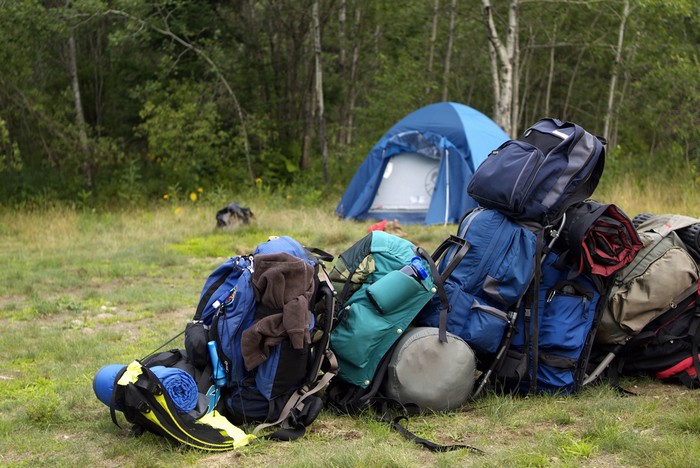Guest post by Jessica Johnson
 Storing camping gear is like going to the dentist. After a visit, we may be prone to slack off on flossing for a little while – perhaps even bail on the next visit...and the next. After a couple of years we have a conundrum on our hands: we know we really should go in, yet we fear the inevitable discovery of cavities. If only we had brushed regularly and gone in every six months!
Storing camping gear is like going to the dentist. After a visit, we may be prone to slack off on flossing for a little while – perhaps even bail on the next visit...and the next. After a couple of years we have a conundrum on our hands: we know we really should go in, yet we fear the inevitable discovery of cavities. If only we had brushed regularly and gone in every six months!
The same goes for outdoor gear. After a couple of days in the backcountry, our mind is set on a hot shower and a cold beverage. The gear often gets wadded up and thrown in the basement – out of mind, out of site. As the days go by, we know we should tend to it, yet the fear of what we might find grows deeper. Until it's time for the next camping trip. Now we have a moldy, unorganized mess to deal with.
Whether you are a seasoned outdoor enthusiast or a once-in-a-while car camper, properly storing your gear is crucial. All it takes is a little know-how and a little more discipline. Here are a few simple tips to consider after a few days in the great outdoors.
1. Keep it dry
Mold, mildew and rust are a camper's worst enemies. Tents, sleeping bags, pads, electronics, and cookware should all be stored in a cool, dry place – avoid attics if possible. If you have to pack up wet gear, be sure to properly air it out when you get home. Set up your tent and give it plenty of sunlight. Wipe down all cookware and electronics and set them outside for a while before storing them.
Consider using a dehumidifier. This will absorb any extra moisture in the air and help keep your gear in tip-top shape.
2. Keep it loose
Rolling up sleeping bags not only invites mold, but can damage the insulation as well, rendering them less effective in the future. Stuff sacks are NOT a good bet for long-term storage. To get the best out of a sleeping bag, keep it hanging loosely on a hanger. The same goes for sleeping pads – keeping them rolled up can damage the foam inside, preventing them from inflating all the way. As for tents, it's best to keep them in a large trash bag where they can breathe. Save the sacks for the next outing!
For electronics, taking out the batteries can prevent corrosion and potential rust damage. Storing devices in sealable bags or tubs will keep out small bugs and cobwebs, as well as unwelcome moisture.
3. Keep it clean
That's right – mud happens to be moist, organic matter, which happens to invite mold and rust. If you have to pack up in muddy conditions, be sure to clean up when you get home! Tents can be hosed off and left in the sun. Dirty cooking gear is likely to attract insects, so be sure to wipe this equipment down with warm water and dish soap. Nasty coolers are best tackled with baking soda and water.
4. Keep it organized
 There are few situations more annoying than pulling up to your favorite spot, watching the last golden rays disappear behind the mountains, and then realizing you forgot the tent poles. Organization can make all the difference in the world! I strongly suggest storing ALL of your gear in the same place. Clearly labeled, sealable plastic tubs are great for long-term storage. Make sure all gear is stored in a dry, climate-controlled environment.
There are few situations more annoying than pulling up to your favorite spot, watching the last golden rays disappear behind the mountains, and then realizing you forgot the tent poles. Organization can make all the difference in the world! I strongly suggest storing ALL of your gear in the same place. Clearly labeled, sealable plastic tubs are great for long-term storage. Make sure all gear is stored in a dry, climate-controlled environment.
I know, I know...I already advised you to hang up your sleeping bag in the closet. Maybe having a stuff sack out with the rest of your gear could serve as a helpful reminder.
Let's face it: humans are high-maintenance creatures. We yearn for the serenity of the great outdoors, yet we require our fair share of conveniences to comfortably do so. Conveniences that cost a pretty penny. Properly caring for our camping gear can not only save us big bucks in the long run, it can save us a great deal of stress when the time comes to pack up and head out.
So next time you come home tired and hungry, don't throw the contents of your car into a big pile in the basement. Sure, you can take a shower first. Have a hot meal. But take the time to tend your things – you will thank yourself later.
And always remember to floss.
Jessica Johnson works for extraspace.com and contributes to the Extra Space Storage blog, exploring various aspects of organizing and storing possessions.



